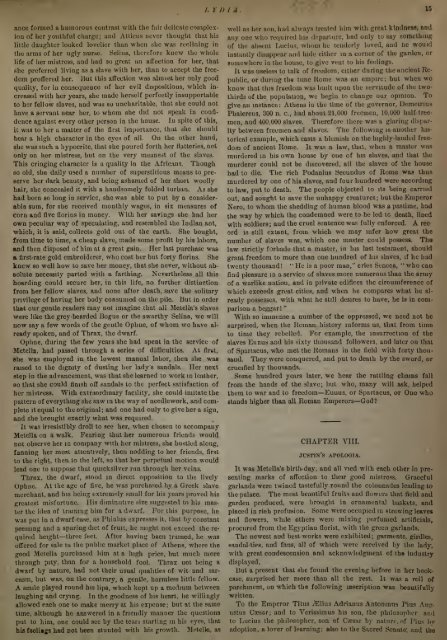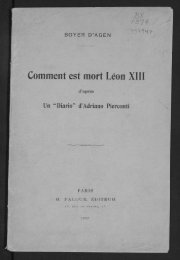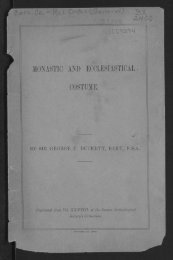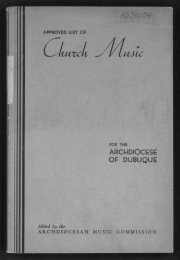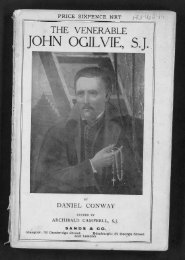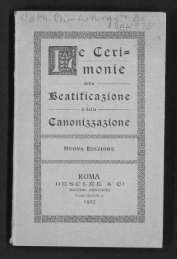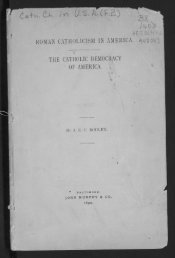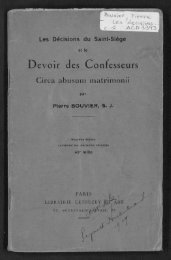Fabiola : or, The church of the catacombs - Digital Repository Services
Fabiola : or, The church of the catacombs - Digital Repository Services
Fabiola : or, The church of the catacombs - Digital Repository Services
Create successful ePaper yourself
Turn your PDF publications into a flip-book with our unique Google optimized e-Paper software.
anCe f<strong>or</strong>med a hum<strong>or</strong>ous contrast with <strong>the</strong> fair delicate complexion<br />
<strong>of</strong> her youthful charge; uml Adieus never thought that his<br />
little daughter looked lovelier than when she was reclining in<br />
<strong>the</strong> arms <strong>of</strong> her ugly nurse. Seiina, <strong>the</strong>ref<strong>or</strong>e knew tin: whole<br />
life <strong>of</strong> her mistress, and had so great an affection f<strong>or</strong> her, that<br />
she preferred living as a slave with her, than to accept <strong>the</strong> freedom<br />
pr<strong>of</strong>fered her. IJut this affection was almost her only good<br />
quality, f<strong>or</strong> in consequence <strong>of</strong> her evil dispositions, which increased<br />
with her years, she made herself perfectly insupp<strong>or</strong>table<br />
to her fellow slaves, and was so uncharitable, that she could not<br />
have a servant near her, to whom she did uot speak in confidence<br />
against every o<strong>the</strong>r person in <strong>the</strong> house. In spite <strong>of</strong> this,<br />
it was to her a matter <strong>of</strong> <strong>the</strong><br />
bear a high character in <strong>the</strong><br />
first imp<strong>or</strong>tance, that slie should<br />
eyes <strong>of</strong> all. On <strong>the</strong> o<strong>the</strong>r hand,<br />
she was such a hypocrite, that she poured f<strong>or</strong>th her flatteries, not<br />
only on her mistress, but on <strong>the</strong> very meanest <strong>of</strong> <strong>the</strong> slaves.<br />
This cringing character is a quality in <strong>the</strong> Africans. Though<br />
so old, she daily used a number <strong>of</strong> superstitious means to pre-<br />
serve her dark beauty, and being ashamed <strong>of</strong> her sh<strong>or</strong>t woolly<br />
hair, she concealed it with a handsomely folded turban. As she<br />
had been so long in service, she was able to put by a consider-<br />
abla sum, f<strong>or</strong> she received monthly wages, in six measures <strong>of</strong><br />
c<strong>or</strong>n and five fl<strong>or</strong>ins in money. With her savings she had her<br />
own peculiar way <strong>of</strong> speculating, and resembled <strong>the</strong> Indian ant,<br />
which, it is said, collects gold out <strong>of</strong> <strong>the</strong> earth. She bought,<br />
from time to time, a cheap slave, made some pr<strong>of</strong>it by his lab<strong>or</strong>s,<br />
and <strong>the</strong>n disposed <strong>of</strong> him at a great gain. Her last purchase was<br />
a first-rate gold embroiderer, who cost her but f<strong>or</strong>ty fl<strong>or</strong>ins. She<br />
knew so well how to save her money, that she never, without ab-<br />
solute necessity parted with a farthing. Never<strong>the</strong>less all this<br />
hoarding could secure her, in this life, no fur<strong>the</strong>r distinctiou<br />
from her fellow slaves, and none after death, save <strong>the</strong> solitary<br />
privilege <strong>of</strong> having her body consumed on <strong>the</strong> pile. But in <strong>or</strong>der<br />
that our gentle readers may not imagine that all Metella's slaves<br />
were like <strong>the</strong> grey-bearded Bogus <strong>or</strong> <strong>the</strong> swarthy Seiina, we will<br />
now say a few w<strong>or</strong>ds <strong>of</strong> <strong>the</strong> gentle Ophue, <strong>of</strong> whom we have already<br />
spoken, and <strong>of</strong> Thrax, <strong>the</strong> dwarf.<br />
Oplme, during <strong>the</strong> few yeais she had spent in <strong>the</strong> service <strong>of</strong><br />
Metella, had passed through a series <strong>of</strong> difficulties. At firgt,<br />
she was employed in <strong>the</strong> lowest manual lab<strong>or</strong>, <strong>the</strong>n she was<br />
raised to <strong>the</strong> dignity <strong>of</strong> dusting her lady s sandals. Her next<br />
step in <strong>the</strong> advancement, was that she learned to w<strong>or</strong>k in lea<strong>the</strong>r,<br />
so that she could finish <strong>of</strong>f sandals to <strong>the</strong> perfect satisfaction <strong>of</strong><br />
her mistress. With extra<strong>or</strong>dinary facility, she could imitate <strong>the</strong><br />
pattern <strong>of</strong> everything she saw in <strong>the</strong> way <strong>of</strong> needlew<strong>or</strong>k, and complete<br />
it equal to <strong>the</strong> <strong>or</strong>iginal and one had ;<br />
only to give her a sign,<br />
and she brought exactly what was required.<br />
It was irresistibly droll to see her, when chosen to accompany<br />
Metella on a walk. Fearing that her numerous friends would<br />
not observe her in company with her mistress, she bustled along,<br />
fanning her most attentively, <strong>the</strong>n nodding to her friends, first<br />
to <strong>the</strong> right, <strong>the</strong>n, to <strong>the</strong> left, so that her perpetual motion would<br />
lead one to suppose that quicksilver ran through her veins.<br />
Thrax. <strong>the</strong> dwarf, stood in direct opposition to <strong>the</strong> lively<br />
Ophne. At <strong>the</strong> age <strong>of</strong> five, he was purchased by a Greek slave<br />
merchant, and his being extremely small f<strong>or</strong> his years proved his<br />
greatest misf<strong>or</strong>tune. His diminutive size suggested to his master<br />
<strong>the</strong> idea <strong>of</strong> training him f<strong>or</strong> a dwarf. F<strong>or</strong> tliis purpose, he<br />
was put in a dwarf -case, as Phinius expresses it, that by constant<br />
pressing and a sparing diet <strong>of</strong> fruit, he might not exceed <strong>the</strong> required<br />
height three feet. After having ben trained, he was<br />
<strong>of</strong>fered f<strong>or</strong> sale in <strong>the</strong> public market place <strong>of</strong> A<strong>the</strong>ns, where <strong>the</strong><br />
good Metella purchased him at a high price, but much m<strong>or</strong>e<br />
through pity, than f<strong>or</strong> a household fool. Thrax not being a<br />
dwarf by nature, had not <strong>the</strong>ir usual qualities <strong>of</strong> wit and sar-<br />
casm, but was, on <strong>the</strong> contrary, a gentle, harmless little fellow.<br />
A smile played round his lips, which kept up a medium between<br />
laughing and crying. In <strong>the</strong> goodness <strong>of</strong> his heart, he willingly<br />
allowed each one to make merry at his expense: but at <strong>the</strong> same<br />
time, although he answered in a friendly manner <strong>the</strong> questions<br />
put to him, one could see by <strong>the</strong> tears starting in his ryes, that<br />
hU feelij*s had not been stunted with his growth. Metella, as<br />
/, r it i A 15<br />
.<br />
well as her son, hud always treated him with great kindness, and<br />
any one who ret|iiireil his departure, had only to say something<br />
<strong>of</strong> <strong>the</strong> absent I.iieius, whom he tenderly loved, and he would<br />
iiist.-intly disappear and hide ei<strong>the</strong>r in a c<strong>or</strong>ner <strong>of</strong> <strong>the</strong> garden, <strong>or</strong><br />
somewhere in <strong>the</strong> house, to give vent to his feelings.<br />
It was useless to talk <strong>of</strong> freedom, ei<strong>the</strong>r during <strong>the</strong> ancient Re-<br />
public, <strong>or</strong> during <strong>the</strong> tune Koine, was an empire; but when wo<br />
know that this freedom was built upon<br />
<strong>the</strong> servitude <strong>of</strong> <strong>the</strong> twothirds<br />
<strong>of</strong> <strong>the</strong> population, we begin to change our opinion. To<br />
give an instance: A<strong>the</strong>ns in <strong>the</strong> time <strong>of</strong> <strong>the</strong> govern<strong>or</strong>, Demetrius<br />
Phulercus, 300 it. c., had about 21,000 freemen, 10,000 bulf- treemen,<br />
and 400,000 slaves. <strong>The</strong>ref<strong>or</strong>e <strong>the</strong>re was a glaring dispar-<br />
ity between freemen and slaves. <strong>The</strong> following is ano<strong>the</strong>r hist<strong>or</strong>ical<br />
example, which casts a blemish on <strong>the</strong> highly-lauded freedom<br />
<strong>of</strong> ancient Rome. It was a law, that, when a master was<br />
murdered in his own house by one <strong>of</strong> his slaves, and that <strong>the</strong><br />
murderer could not be discovered, all <strong>the</strong> slaves <strong>of</strong> <strong>the</strong> house<br />
had to die. <strong>The</strong> rich Podanius Secundus <strong>of</strong> Rome was thus<br />
murdered by one <strong>of</strong> his slaves, and four hundred were acc<strong>or</strong>ding<br />
to law, put to death. <strong>The</strong> people objected to its being carried<br />
out, and sought to save <strong>the</strong> unhappy creatures; but <strong>the</strong> Emper<strong>or</strong><br />
Nero, to whom <strong>the</strong> shedding <strong>of</strong> human blood was a pastime, had<br />
<strong>the</strong> way by which <strong>the</strong> condemned were to be led tc death, lined<br />
with soldiers; and <strong>the</strong> cruel sentence was fully enf<strong>or</strong>ced. A rcc<br />
<strong>or</strong>d is still extant, from which we may infer how great <strong>the</strong><br />
number <strong>of</strong> slaves was, which one master could possess. Tho<br />
law strictly f<strong>or</strong>bade that a master, in his last testament, should<br />
grant freedom to m<strong>or</strong>e than one hundred <strong>of</strong> his slaves, if he had<br />
twenty thousand!<br />
" He is a po<strong>or</strong> man," cries Seneca, " who can<br />
find pleasure in a service <strong>of</strong> slaves m<strong>or</strong>e numerous than <strong>the</strong> army<br />
<strong>of</strong> a warlike nation, and in private edifices <strong>the</strong> circumference <strong>of</strong><br />
which exceeds great cities, and when he compares what he already<br />
possesses, with what he still desires to "<br />
have, he is in com-<br />
parison a beggar !<br />
With so immense a number <strong>of</strong> <strong>the</strong> oppressed, we need not be<br />
surprised, when <strong>the</strong> Roman hist<strong>or</strong>y inf<strong>or</strong>ms us, that from time<br />
to time <strong>the</strong>y rebelled. F<strong>or</strong> example, <strong>the</strong> insurrection <strong>of</strong> <strong>the</strong><br />
slaves Eunus and his sixty thousand followers, and later OD that<br />
<strong>of</strong> Spartacus, who met <strong>the</strong> Romans in <strong>the</strong> field with f<strong>or</strong>ty thou-<br />
sand. <strong>The</strong>y were conquered, and put to death by <strong>the</strong> sw<strong>or</strong>d, <strong>or</strong><br />
crucified by thousands.<br />
Some hundred years later, we hear <strong>the</strong> rattling chains fall<br />
from <strong>the</strong> hands <strong>of</strong> <strong>the</strong> slave; but who, many will ask, helped<br />
<strong>the</strong>m to war and to freedom Eunus, <strong>or</strong> Spartacus, <strong>or</strong> One who<br />
stands higher than all Roman Emper<strong>or</strong>s God?<br />
CHAPTER VIII.<br />
JUSTIN'S APOLOGIA.<br />
It was Metella's birth-day, and all vied with each o<strong>the</strong>r in presenting<br />
marks <strong>of</strong> affection to <strong>the</strong>ir good mistress. Graceful<br />
garlands were twined tastefully round <strong>the</strong> colonnades leading to<br />
<strong>the</strong> palace. <strong>The</strong> most beautiful fruits and flowers that field and<br />
garden produced, were brought in <strong>or</strong>namental placed<br />
baskets, and<br />
in rich pr<strong>of</strong>usion. Some were occupied m strewing leaves<br />
and flowers, while o<strong>the</strong>rs were mixing perfumed artificials,<br />
procured from <strong>the</strong> Egyptian fl<strong>or</strong>ist, with <strong>the</strong> green garlands.<br />
<strong>The</strong> newest and best w<strong>or</strong>ks were exhibited; garments, girdles,<br />
sandal-ties, and fans, all <strong>of</strong> which were received by <strong>the</strong> lady,<br />
with great condescension and acknowledgment <strong>of</strong> th<br />
industry<br />
displayed.<br />
But a present that she found <strong>the</strong> evening bef<strong>or</strong>e in her bookcase,<br />
surprised her m<strong>or</strong>e than all <strong>the</strong> rest. It was a roll <strong>of</strong><br />
parchment, on which <strong>the</strong> following<br />
written.<br />
inscription was beautifully<br />
To <strong>the</strong> Emper<strong>or</strong> Titus ./Elius Adriamis Antoninus Pius An?<br />
ustus Cmsar; and to Verissimus his son, <strong>the</strong> philosopher ami<br />
to Lucius <strong>the</strong> philosopher, son <strong>of</strong> Cicsar by nature, <strong>of</strong> Pius by<br />
adoption, a lover <strong>of</strong> learning; also to <strong>the</strong> Sacred Senate', and <strong>the</strong>


